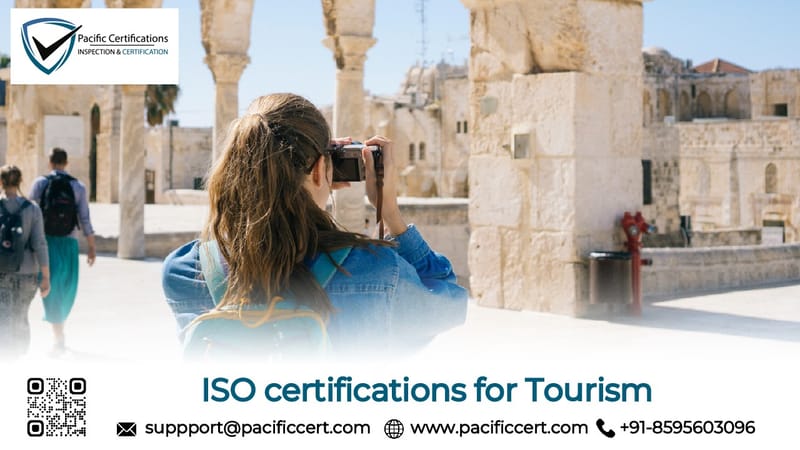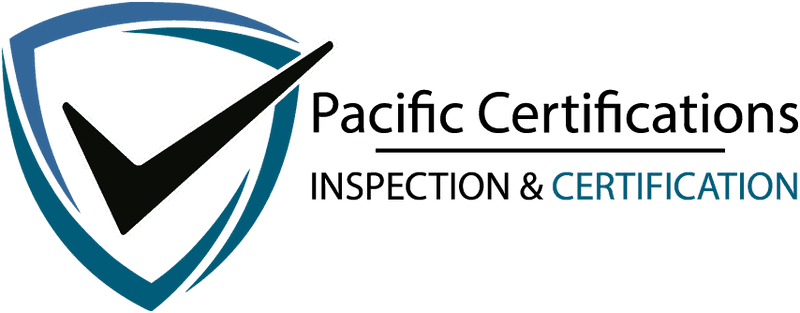ISO Certifications for Tourism Businesses, Requirements and Benefits

Introduction
Tourism is one of the most dynamic and competitive industries in the world. From a hotel chain, to an eco-resort, businesses in this sector depend on customer trust, service quality, safety, and sustainability. With travelers demanding higher standards, global credibility has become a necessity.
ISO certifications give tourism companies the structure and recognition they need to operate reliably and responsibly. These international standards help demonstrate that your business manages quality and sustainability in line with globally accepted best practices, building confidence among tourists as well as partners.
If your tourism business is seeking ISO certification, reach out to us at [email protected]
In tourism, trust is earned one guest at a time, ISO certification turns that trust into a measurable standard.
Quick Summary
ISO certifications give tourism businesses a trusted way to manage quality, safety, sustainability, and guest confidence. Whether it’s keeping kitchens hygienic, protecting traveler data, or reducing environmental impact, these standards help organizations meet global quality expectations while improving efficiency and strengthening brand reputation.
Applicable ISO Standards for Tourism Businesses
Here are some of the key ISO standards relevant to the tourism sector:
ISO Standard | Purpose | Relevance |
|---|---|---|
ISO 9001:2015 | Quality Management System for consistent service. | Ensures reliable guest experiences and continuous improvement. |
ISO 14001:2015 | Environmental Management System. | Promotes sustainable tourism and reduces environmental impact. |
ISO 45001:2018 | Occupational Health & Safety Management. | Improves workplace safety for staff and visitors. |
ISO 22000:2018 | Food Safety Management System. | Maintains hygiene and food safety in kitchens and dining areas. |
ISO 50001:2018 | Energy Management System. | Reduces energy use and supports eco-friendly operations. |
ISO/IEC 27001:2022 | Information Security Management. | Protects customer data and online booking information. |
ISO 22301:2019 | Business Continuity Management. | Keeps operations running during emergencies or disruptions. |
ISO 20121:2012 | Sustainable Event Management. | Supports green and socially responsible tourism events. |
ISO 9001:2015 - Quality Management Systems
ISO 9001 sets out the criteria for a quality management system (QMS) and is based on several quality management principles, including a strong customer focus, the motivation and involvement of top management, a process approach, and continual improvement.
ISO 14001:2015 - Environmental Management Systems
ISO 14001 provides a framework for organizations to manage their environmental responsibilities systematically, reduce waste, and minimize resource consumption. By obtaining ISO 14001 certification, tourism businesses can showcase their commitment to sustainability and attract environmentally conscious customers.
ISO 45001:2018 - Occupational Health and Safety Management Systems
ISO 45001 is the first global standard for occupational health and safety (OHS) management systems. This standard helps organizations reduce workplace risks and create safer working conditions. For tourism businesses, which often involve activities that pose safety risks to both employees and customers ISO 45001 is crucial.
ISO 21101:2014 - Adventure Tourism: Safety Management Systems
ISO 21101 specifies the requirements for a safety management system for adventure tourism. Adventure tourism involves activities that are inherently risky, such as mountain climbing, scuba diving, and paragliding. This standard helps adventure tourism operators manage these risks effectively and provide safe experiences for their customers.
ISO 21401:2018 - Sustainability Management System for Accommodation Establishments
ISO 21401 provides a framework for sustainability management in accommodation establishments, such as hotels, resorts, and lodges. This standard addresses environmental, social, and economic aspects of sustainability, helping accommodation providers reduce their environmental footprint, support local communities, and operate more efficiently.
ISO 22483:2020 - Tourism and Related Services: Hotels and Other Types of Tourist Accommodation
ISO 22483 specifies the requirements for the provision of quality services in hotels and other types of tourist accommodation. This standard covers aspects such as staff competence, safety and security, service delivery, and guest satisfaction. By adhering to ISO 22483, accommodation providers can ensure consistent service quality, enhance guest experiences, and meet international standards.
ISO 18513:2003 - Tourism Services: Hotels and Other Types of Tourism Accommodation
ISO 18513 establishes common terminology and definitions for tourism accommodation services, helping to standardize the industry and improve communication between service providers and customers. While not a management system standard, ISO 18513 is essential for ensuring clarity and consistency in the tourism industry.
ISO 20611:2018 - Adventure Tourism: Good Practices for Sustainability
ISO 20611 provides guidelines for sustainable practices in adventure tourism activities, focusing on minimizing environmental impact and promoting cultural respect. This standard helps adventure tourism operators implement sustainable practices, contribute to environmental conservation, and engage with local communities in a positive manner.
Click here to find out more applicable standards to your industry
For expert assistance in achieving ISO certification for your tourism company, contact us at [email protected]
How We Can Help
At Pacific Certifications, we are accredited by ABIS, we provide independent ISO certification services for tourism and hospitality organizations around the world. We assess your management systems against international standards and issue accredited certificates that validate your commitment to quality, safety, and sustainability.
Our support includes:
• Conducting Stage 1 and Stage 2 certification audits to verify compliance.
• Reviewing documentation, operational practices, and internal systems.
• Issuing accredited ISO certificates valid for three years, with annual surveillance audits.
• Covering tourism-relevant standards such as ISO 9001, ISO 14001, ISO 45001, ISO 22000, ISO 50001, ISO/IEC 27001, and ISO 20121.
• Helping businesses strengthen credibility and meet global tourism requirements through independent certification.
Ready to elevate your tourism business with ISO certification? Contact us today at [email protected] or +91-8595603096.
What are the requirements of ISO Certifications for Tourism Industry?
Tourism organizations must meet key operational and compliance requirements to achieve an ISO certification. These requirements help ensure that service delivery, safety, and sustainability standards are consistently maintained across operations.
Key requirements include:
- • Define the scope of services, including accommodation, food, tours, and customer interaction points.
- • Develop a documented management system that reflects company objectives, roles, and responsibilities.
- • Identify and evaluate risks related to customer safety, data protection, environmental impact, and service quality.
- • Establish measurable quality and safety objectives with defined monitoring processes.
- • Implement internal audits, inspections, and reviews to check compliance with ISO standards.
- • Maintain records of operational procedures, customer feedback, and improvement actions.
- • Provide staff training on quality, hygiene, sustainability, and health and safety practices.
- • Undergo independent audits conducted by an accredited certification body
Tip: Begin with one core area that impacts guests the most, such as service quality or health and safety, and align your processes with the relevant ISO standard first. Once that system is stable, expand to other standards like environment, food safety, and data protection for a fully integrated management approach.
What are the benefits of ISO Certifications for Tourism Industry
ISO certification provides a trusted framework that helps tourism companies enhance service quality, ensure safety, and operate responsibly. It builds credibility among travelers and creates measurable improvements in both reputation and performance.
Key benefits include:
• Enhances guest satisfaction through consistent and high-quality service delivery.
• Demonstrates environmental responsibility by reducing waste and managing resources efficiently.
• Strengthens employee and visitor safety through clear occupational health protocols.
• Improves food hygiene and safety in restaurants, resorts, and catering facilities.
• Builds customer trust by safeguarding personal and financial information.
• Supports sustainable tourism practices that attract eco-conscious travelers and investors.
• Ensures business continuity and readiness during unexpected disruptions or crises.
• Increases global competitiveness by aligning operations with internationally recognized standards.
• Helps reduce costs through better process control, energy savings, and efficient resource use.
• Boosts brand credibility and makes collaboration easier with global travel networks and corporate partners.
The global tourism market is rebounding strongly post-pandemic, projected to reach USD 11.1 trillion by 2025, accounting for about 11% of global GDP. Sustainable travel, data privacy, and customer health safety are now top priorities for travelers. Reports show that over 73% of tourists prefer booking with certified or eco-labeled operators. Adventure tourism alone is expected to grow at a CAGR of 17%, while digital booking platforms are expanding rapidly, handling over 70% of travel reservations worldwide.
With this growth, certification to international standards is becoming a mark of reliability. Tourism businesses adopting ISO 9001, ISO 14001, and ISO 45001 are gaining a clear advantage and customer loyalty.
If case you need support with ISO certification for your Tourism Industry business, please contact us at [email protected] or +91-8595603096.
FAQs: ISO Certifications for Tourism Industry
What is ISO certification, and why is it important for the tourism industry?
For the tourism industry, ISO certification is important because it ensures consistent service quality, enhances customer satisfaction, and improves operational efficiency.
Which ISO standards are most relevant to the tourism industry?
ISO 9001 (Quality Management), ISO 14001 (Environmental Management), ISO 45001 (Occupational Health and Safety), ISO 21101 (Adventure Tourism Safety) are most popular in tourism industry.
How long does it take to obtain ISO certification for a tourism business?
On average, the certification process can take several months, including time for documentation preparation, internal audits, and the certification audit.
Can Pacific Certifications help with the implementation of ISO standards?
No, Pacific Certifications does not provide consultancy or implementation services. Our role is to conduct audits and issue ISO certifications.
What are the costs associated with ISO certification for tourism businesses?
The costs of ISO certification depend on several factors, including the size and scope of the business, the specific ISO standard, and the duration of the audit.
How can ISO certification benefit my tourism business?
ISO certification offers numerous benefits, including enhanced customer satisfaction, improved operational efficiency, a stronger reputation, compliance with legal requirements, and a commitment to sustainability.
How often will my business need to undergo audits after obtaining ISO certification?
After obtaining ISO certification, your business will need to undergo regular surveillance audits, typically once a year, to ensure continued compliance.
What happens if my business does not pass the certification audit?
If your business does not pass the certification audit, Pacific Certifications will provide a detailed report outlining the non-conformities identified during the audit. Your business will need to address these issues and undergo a follow-up audit to achieve certification.
Author: Ashish
Read More at: Blogs by Pacific Certifications

